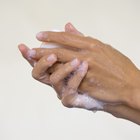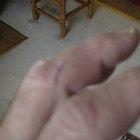warrengoldswain/iStock/GettyImages
Fingers Should Touch, Not Smell
Crisp and clean, the smell of citrus typically represents freshness – a lot of household cleaning supplies use it as fragrance, after all. But aroma doesn't indicate cleanliness. In fact, when you have "that citrus smell" on your hands, it indicates oiliness. It's a highly volatile oil that evaporates at room temperature, imbuing your hands, and everything they touch, with a seemingly perpetual source of orange, lemon, lime or whatever citrus you peeled. There's no shortage of citrus-smell solutions out there, but when you need the most effective, do what the pros do – use a solvent.
In the Professional Kitchen
Chefs usually prefer to work with their hands; you just don't get the tactility you need for the composed presentations, exacting ingredient manipulation and "measuring ability" required in high-end restaurants otherwise. But using your fingers is a double-edged sword. Sure, you get more control, but your fingers pick up a little more smell and debris that way, and for a self-respecting chef, cleanliness takes precedence. So how do chefs deal with citrus-finger? A rough scrub to help lift the oil from microscopic skin ridges, creases, folds and those hard-to-reach areas under the fingernails and, if needed, a little solvent wash (hand sanitizer) afterward.
The Method
When you approach the citrus-smell problem pragmatically – you're really just lifting an aromatic vegetable oil out of the of nooks and crannies of your hands and rinsing it away – the simplest solution proves most effective: Get the oil to the surface, and use a solvent to help with the tight spots.
Scrub, using baking soda and a fingernail brush. Scrub more than just under your fingernails and finger pads, get everything on the offending digit; in fact, you might have an easier time if you just go ahead and do the whole hand.
Wash using dish soap, which contains hydrophilic molecules (they attract water) and hydrophobic molecules (they reject water). This combo breaks up the citrus oil into smaller drops water can wash away.
Rinse using hand sanitizer and water. Short alcohols like those found in rubbing alcohol and hand sanitizer are amphiphilic, so they combine with the citrus oil; a quick rinse rids your hands of both the remnants of the citrus oil and any traces of alcohol.
Related Articles

How to Get Rid of Sunless Tanning ...

How to Get Invisible Ink Off of the Skin

How to Get Oil Out of Uggs

Ingredients in Hand Soap

Alternatives for a Clipper Blade Wash

How to Remove the Smell of Cologne From ...

How to Take Off Fake Eyelashes Without ...

What Are the Benefits of Perfume Oils?

How to Get Rid of Perfume Odor

How to Take Care of Wrinkled Hands

How to Peel Raw Beets

What Are the Benefits of Using Hand ...

The Effectiveness of Purell
How to Clean Cherry Juice Stains Off ...

Benefits of Sea Salt Glow Body Treatment

How to Get Sticker Residue Off of a ...

How to Get Pen Ink Off of Hands

Olive Oil Soap for Acne

How to Soak Acrylic Nails off in Nail ...

Facts on Zest Bar Soap
References
Writer Bio
A.J. Andrews' work has appeared in Food and Wine, Fricote and "BBC Good Food." He lives in Europe where he bakes with wild yeast, milks goats for cheese and prepares for the Court of Master Sommeliers level II exam. Andrews received formal training at Le Cordon Bleu.